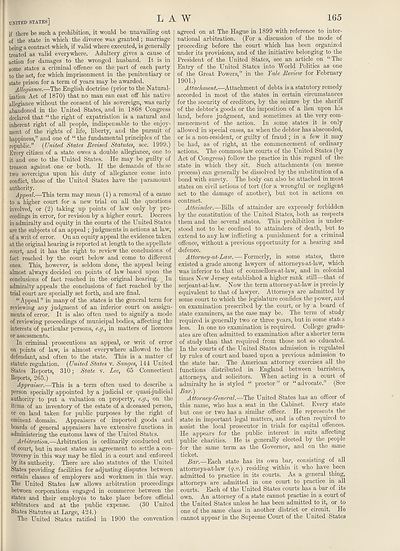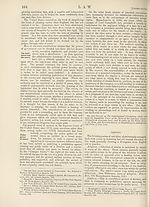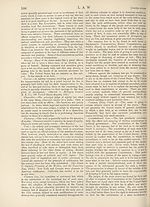New volumes of the Encyclopædia Britannica > Volume 30, K-MOR
(189) Page 165
Download files
Complete book:
Individual page:
Thumbnail gallery: Grid view | List view

165
LAW
UNITED STATES]
if there be such a prohibition, it would be unavailing out
of the state in which the divorce was granted; marriage
being a contract which, if valid where executed, is generally
treated as valid everywhere. Adultery gives a cause of
action for damages to the wronged husband. It is in
some states a criminal offence on the part of each party
to the act, for which imprisonment in the penitentiary or
state prison for a term of years may be awarded.
Allegiance.—The English doctrine (prior to the Natural¬
ization Act of 1870) that no man can cast off his native
allegiance without the consent of his sovereign, was early
abandoned in the United States, and in 1868 Congress
declared that “ the right of expatriation is a natural and
inherent right of all people, indispensable to the enjoy¬
ment of the rights of life, liberty, and the pursuit of
happiness,” and one of “ the fundamental principles of the
republic.” {United States Revised Statutes, sec. 1999.)
Every citizen of a state owes a double allegiance, one to
it and one to the United States. He may be guilty of
treason against one or both. If the demands of these
two sovereigns upon his duty of allegiance come into
conflict, those of the United States have the paramount
authority.
Appeal.—This term may mean (1) a removal of a cause
to a higher court for a new trial on all the questions
involved, or (2) taking up points of law only by pro¬
ceedings in error, for revision by a higher court. Decrees
in admiralty and equity in the courts of the United States
are the subjects of an appeal; judgments in actions at law,
of a writ of error. On an equity appeal the evidence taken
at the original hearing is reported at length to the appellate
court, and it has the right to review the conclusions of
fact reached by the court below and come to different
ones. This, however, is seldom done, the appeal being
almost always decided on points of law based upon the
conclusions of fact reached in the original hearing. In
admiralty appeals the conclusions of fact reached by the
trial court are specially set forth, and are final.
“ Appeal ” in many of the states is the general term for
reviewing any judgment of an inferior court on assign¬
ments of error. It is also often used to signify a mode
of reviewing proceedings of municipal bodies, affecting the
interests of particular persons, e.g., in matters of licences
or assessments.
In criminal prosecutions an appeal, or writ of error
on points of law, is almost everywhere allowed to the
defendant, and often to the state. This is a matter of
statute regulation. {United States v. Sanges, 144 United
States Reports, 310; State v. Lee, 65 Connecticut
Reports, 265.)
Appraiser.—This is a term often used to describe a
person specially appointed by a judicial or quasi-judicial
authority to put a valuation on property, e.g., on the
items of an inventory of the estate of a deceased person,
or on land taken for public purposes by the right of
eminent domain. Appraisers of imported goods and
boards of general appraisers have extensive functions in
administering the customs laws of the United States.
Arbitration.—Arbitration is ordinarily conducted out
of court, but in most states an agreement to settle a con¬
troversy in this way may be filed in a court and enforced
by its authority. There are also statutes of the United
States providing facilities for adjusting disputes between
certain classes of employers and workmen in this way.
The United States law allows arbitration proceedings
between corporations engaged in commerce between the
states and their employes to take place before official
arbitrators and at the public expense. (30 United
States Statutes at Large, 424.)
The United States ratified in 1900 the convention
agreed on at The Hague in 1899 with reference to inter¬
national arbitration. (For a discussion of the mode of
proceeding before the court which has been organized
under its provisions, and of the initiative belonging to the
President of the United States, see an article on “The
Entry of the United States into World Politics as one
of the Great Powers,” in the Yale Review for February
1901.)
Attachment.—Attachment of debts is a statutory remedy
accorded in most of the states in certain circumstances
for the security of creditors, by the seizure by the sheriff
of the debtor’s goods or the imposition of a lien upon his
land, before judgment, and sometimes at the very com¬
mencement of the action. In some states it is only
allowed in special cases, as when the debtor has absconded,
or is a non-resident, or guilty of fraud ; in a few it may
be had, as of right, at the commencement of ordinary
actions. The common-law courts of the United States (by
Act of Congress) follow the practice in this regard of the
state in which they sit. Such attachments (on mesne
process) can generally be dissolved by the substitution of a
bond with surety. The body can also be attached in most
states on civil actions of tort (for a wrongful or negligent
act to the damage of another), but not in actions on
contract.
Attainder.—Bills of attainder are expressly forbidden
by the constitution of the United States, both as respects
them and the several states. This prohibition is under¬
stood not to be confined to attainders of death, but to
extend to any law inflicting a punishment for a criminal
offence, without a previous opportunity for a hearing and
defence.
Attorney-at-Law. — Formerly, in some states, there
existed a grade among lawyers of attorneys-at-law, which
was inferior to that of counsellors-at-law, and in colonial
times New Jersey established a higher rank still—that of
serjeant-at-law. Now the term attorney-at-law is precisely
equivalent to that of lawyer. Attorneys are admitted by
some court to which the legislature confides the power, and
on examination prescribed by the court, or by a board of
state examiners, as the case may be. The term of study
required is generally two or three years, but in some state s
less. In one no examination is required. College gradu¬
ates are often admitted to examination after a shorter term
of study than that required from those not so educated.
In the courts of the United States admission is regulated
by rules of court and based upon a previous admission to
the state bar. The American attorney exercises all the
functions distributed in England between barristers,
attorneys, and solicitors. When acting in a court of
admiralty he is styled “ proctor ” or “ advocate.” (See
Bar.)
Attorney-General.—The United States has an officer of
this name, who has a seat in the Cabinet. Every state
but one or two has a similar officer. He represents the
state in important legal matters, and is often required to
assist the local prosecutor in trials for capital offences.
He appears for the public interest in suits affecting
public charities. He is generally elected by the people
for the same term as the Governor, and on the same
ticket.
Bar.—Each state has its own bar, consisting of all
attorneys-at-law {q.v.) residing within it who have been
admitted to practice in its courts. As a general thing,
attorneys are admitted in one court to practice in all
courts. Each of the United States courts has a bai of its
own. An attorney of a state cannot practise in a court of
the United States unless he has been admitted to it, or to
one of the same class in another district or circuit. He
cannot appear in the Supreme Court of the U nited States
LAW
UNITED STATES]
if there be such a prohibition, it would be unavailing out
of the state in which the divorce was granted; marriage
being a contract which, if valid where executed, is generally
treated as valid everywhere. Adultery gives a cause of
action for damages to the wronged husband. It is in
some states a criminal offence on the part of each party
to the act, for which imprisonment in the penitentiary or
state prison for a term of years may be awarded.
Allegiance.—The English doctrine (prior to the Natural¬
ization Act of 1870) that no man can cast off his native
allegiance without the consent of his sovereign, was early
abandoned in the United States, and in 1868 Congress
declared that “ the right of expatriation is a natural and
inherent right of all people, indispensable to the enjoy¬
ment of the rights of life, liberty, and the pursuit of
happiness,” and one of “ the fundamental principles of the
republic.” {United States Revised Statutes, sec. 1999.)
Every citizen of a state owes a double allegiance, one to
it and one to the United States. He may be guilty of
treason against one or both. If the demands of these
two sovereigns upon his duty of allegiance come into
conflict, those of the United States have the paramount
authority.
Appeal.—This term may mean (1) a removal of a cause
to a higher court for a new trial on all the questions
involved, or (2) taking up points of law only by pro¬
ceedings in error, for revision by a higher court. Decrees
in admiralty and equity in the courts of the United States
are the subjects of an appeal; judgments in actions at law,
of a writ of error. On an equity appeal the evidence taken
at the original hearing is reported at length to the appellate
court, and it has the right to review the conclusions of
fact reached by the court below and come to different
ones. This, however, is seldom done, the appeal being
almost always decided on points of law based upon the
conclusions of fact reached in the original hearing. In
admiralty appeals the conclusions of fact reached by the
trial court are specially set forth, and are final.
“ Appeal ” in many of the states is the general term for
reviewing any judgment of an inferior court on assign¬
ments of error. It is also often used to signify a mode
of reviewing proceedings of municipal bodies, affecting the
interests of particular persons, e.g., in matters of licences
or assessments.
In criminal prosecutions an appeal, or writ of error
on points of law, is almost everywhere allowed to the
defendant, and often to the state. This is a matter of
statute regulation. {United States v. Sanges, 144 United
States Reports, 310; State v. Lee, 65 Connecticut
Reports, 265.)
Appraiser.—This is a term often used to describe a
person specially appointed by a judicial or quasi-judicial
authority to put a valuation on property, e.g., on the
items of an inventory of the estate of a deceased person,
or on land taken for public purposes by the right of
eminent domain. Appraisers of imported goods and
boards of general appraisers have extensive functions in
administering the customs laws of the United States.
Arbitration.—Arbitration is ordinarily conducted out
of court, but in most states an agreement to settle a con¬
troversy in this way may be filed in a court and enforced
by its authority. There are also statutes of the United
States providing facilities for adjusting disputes between
certain classes of employers and workmen in this way.
The United States law allows arbitration proceedings
between corporations engaged in commerce between the
states and their employes to take place before official
arbitrators and at the public expense. (30 United
States Statutes at Large, 424.)
The United States ratified in 1900 the convention
agreed on at The Hague in 1899 with reference to inter¬
national arbitration. (For a discussion of the mode of
proceeding before the court which has been organized
under its provisions, and of the initiative belonging to the
President of the United States, see an article on “The
Entry of the United States into World Politics as one
of the Great Powers,” in the Yale Review for February
1901.)
Attachment.—Attachment of debts is a statutory remedy
accorded in most of the states in certain circumstances
for the security of creditors, by the seizure by the sheriff
of the debtor’s goods or the imposition of a lien upon his
land, before judgment, and sometimes at the very com¬
mencement of the action. In some states it is only
allowed in special cases, as when the debtor has absconded,
or is a non-resident, or guilty of fraud ; in a few it may
be had, as of right, at the commencement of ordinary
actions. The common-law courts of the United States (by
Act of Congress) follow the practice in this regard of the
state in which they sit. Such attachments (on mesne
process) can generally be dissolved by the substitution of a
bond with surety. The body can also be attached in most
states on civil actions of tort (for a wrongful or negligent
act to the damage of another), but not in actions on
contract.
Attainder.—Bills of attainder are expressly forbidden
by the constitution of the United States, both as respects
them and the several states. This prohibition is under¬
stood not to be confined to attainders of death, but to
extend to any law inflicting a punishment for a criminal
offence, without a previous opportunity for a hearing and
defence.
Attorney-at-Law. — Formerly, in some states, there
existed a grade among lawyers of attorneys-at-law, which
was inferior to that of counsellors-at-law, and in colonial
times New Jersey established a higher rank still—that of
serjeant-at-law. Now the term attorney-at-law is precisely
equivalent to that of lawyer. Attorneys are admitted by
some court to which the legislature confides the power, and
on examination prescribed by the court, or by a board of
state examiners, as the case may be. The term of study
required is generally two or three years, but in some state s
less. In one no examination is required. College gradu¬
ates are often admitted to examination after a shorter term
of study than that required from those not so educated.
In the courts of the United States admission is regulated
by rules of court and based upon a previous admission to
the state bar. The American attorney exercises all the
functions distributed in England between barristers,
attorneys, and solicitors. When acting in a court of
admiralty he is styled “ proctor ” or “ advocate.” (See
Bar.)
Attorney-General.—The United States has an officer of
this name, who has a seat in the Cabinet. Every state
but one or two has a similar officer. He represents the
state in important legal matters, and is often required to
assist the local prosecutor in trials for capital offences.
He appears for the public interest in suits affecting
public charities. He is generally elected by the people
for the same term as the Governor, and on the same
ticket.
Bar.—Each state has its own bar, consisting of all
attorneys-at-law {q.v.) residing within it who have been
admitted to practice in its courts. As a general thing,
attorneys are admitted in one court to practice in all
courts. Each of the United States courts has a bai of its
own. An attorney of a state cannot practise in a court of
the United States unless he has been admitted to it, or to
one of the same class in another district or circuit. He
cannot appear in the Supreme Court of the U nited States
Set display mode to:
![]() Universal Viewer |
Universal Viewer | ![]() Mirador |
Large image | Transcription
Mirador |
Large image | Transcription
Images and transcriptions on this page, including medium image downloads, may be used under the Creative Commons Attribution 4.0 International Licence unless otherwise stated. ![]()
| Encyclopaedia Britannica > New volumes of the Encyclopædia Britannica > Volume 30, K-MOR > (189) Page 165 |
|---|
| Permanent URL | https://digital.nls.uk/193569958 |
|---|
| Attribution and copyright: |
|
|---|---|
| Shelfmark | EB.18 |
|---|---|
| Description | Ten editions of 'Encyclopaedia Britannica', issued from 1768-1903, in 231 volumes. Originally issued in 100 weekly parts (3 volumes) between 1768 and 1771 by publishers: Colin Macfarquhar and Andrew Bell (Edinburgh); editor: William Smellie: engraver: Andrew Bell. Expanded editions in the 19th century featured more volumes and contributions from leading experts in their fields. Managed and published in Edinburgh up to the 9th edition (25 volumes, from 1875-1889); the 10th edition (1902-1903) re-issued the 9th edition, with 11 supplementary volumes. |
|---|---|
| Additional NLS resources: |
|

